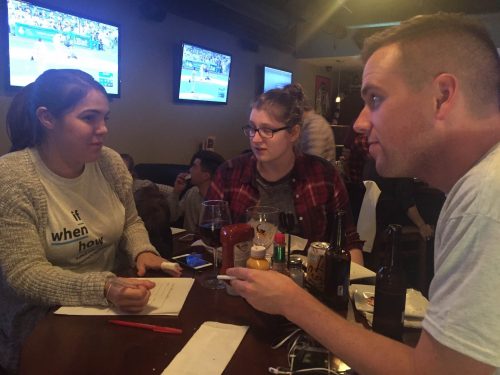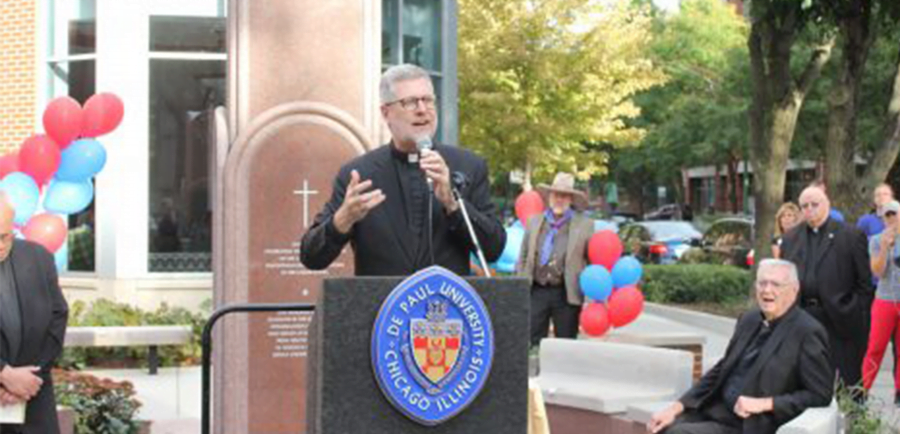A small but determined group of middle-aged bar-goers headed to the basement of Pazzo’s — an Italian restaurant near DePaul’s Loop campus — to watch the Cubs game in seclusion last Wednesday night.
Instead, they were greeted by around 40 DePaul law students and their friends loudly playing a game of sex trivia. The questions filtered in through a microphone one-by-one — and even the Cubs fans couldn’t help but be interested.
“OK everyone, 83 percent of males and what percent of females reported masturbating last year?”
“What percentage of teens used birth control when they lost their virginity?”
“What Supreme Court case affirmed a woman’s right to an abortion until fetal viability?”

The event, which was held by the DePaul School of Law’s chapter of the reproductive justice group If/When/How, focused on providing information about sexual health that may not otherwise be readily available. Outlaws, the law school’s LGBTQ group, co-sponsored the night alongside the Chicago Kent Law School’s chapter of If/When/How.
“This is used to educate people on what isn’t taught in abstinence-only sex education,” said Kellie Snyder, a law student and the president of If/When/How. “I actually talked to a lot of my friends who went to conservative high schools and had abstinence-only sex ed and kind of just asked them, ‘What do you wish you’d learned? What didn’t you know?’”
As it turned out, the answer was quite a bit. Snyder said one of her male friends, for instance, didn’t know how birth control worked until his girlfriend explained it to him in college. Joey Droter, the treasurer for Outlaws, added that he grew up in an abstinence-only education system in Virginia.
“We all learned about nothing,” he said.
The trivia itself was divided into four rounds centered around four different topics: percentages and statistics, pleasure, LGBT and contraception. Each round featured 10 questions — all written by Snyder — related to the given theme.
Snyder and If/When/How’s secretary, Heather Stallings, perched on top of the bar with microphones and trivia cards to call out the questions. When each round finished, the groups piled up to the front to get their scorecards tallied.
The winning group from the got to pick from a variety of gift bags, which included goodies like sex toy coloring books and Starbucks gift cards. There was also a category for best team name, as well as a $25 Epic Burger gift card for any person who could guess the amount of condoms on display in a bucket. Plus, pizza was served.
“It’s supposed to be educational, but it’s a fun way to do it,” Snyder said.
Many of the event’s attendees were surprised by how little they knew. Alex Cox, a law student who’s also a member of If/When/How, described herself as pro-reproductive justice but was also caught off guard by some of the trivia answers.
“I think it’s really interesting,” Cox said. “It’s fun for everyone involved but you also learn a lot. There’s a lot of statistics that shock you when you learn the answers. The number of teens who don’t use protection when they lose their virginity is a lot higher than I thought it was.”
Stallings said that “even though (they’re) 23 or 24 years old,” the audience couldn’t help but nervously giggle when they heard certain sex buzzwords.
“It just shows how little we know about ourselves and each other, and about what sex actually is. It’s something that everyone goes through that we all know so little about,” Stallings said. “I think it’s good to talk about it publicly and throw those awkward terms like clitoris, vagina, penis size, virginity out there. It definitely helps reduce stigma against it.”
For If/When/How, which has about 35 members, the event is just one part of their overall mission within DePaul. The national organization recently underwent a rebranding and name change — it used to be called Lawyering for Reproductive Justice.
Within DePaul’s chapter, Snyder said one primary goal is to introduce curriculum within the law school that focuses on reproductive justice — if not a specific specialty track, then perhaps just a class centered around the subject.
“We can pick specializations (in the School of Law), but there isn’t a reproductive rights specialty, or even a class at DePaul, which is something that we’re trying to change,” Snyder said. “I definitely went to law school because I wanted to advocate for women’s rights. This is a near and dear topic to my heart.”
The group also holds events to raise money for charities like Every Mother Counts and organizations that help women in Africa become midwives to reduce the death rate of childbirth. Snyder said it’s initiatives like these that speak to the group’s mission statement: “Ensuring that all people can decide if, when and how to create families depends entirely if, when and how hard we fight.” The message is emblazoned on the back of their shirts.
“I love that message because it’s very inclusive of everyone’s beliefs, and it doesn’t really matter where you’re coming from,” Snyder said. “Everyone can agree that women deserve health care, and to give birth and have access to that material. So I think that’s why it means so much to me.”



